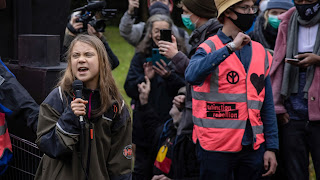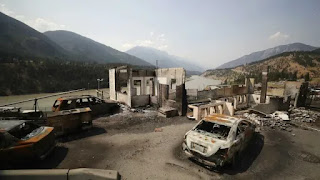Quit waiting for someone else to solve climate change
For over three decades many of us have watched the global discussion about climate change with growing alarm. The scientists have shown, with increasing certainty, that climate change presents an existential threat to our kids and their kids.
 |
| Photo: Jonne Roriz/Bloomberg |
We have raged
with frustration at the specious arguments put forward by those with vested interest
in maintaining the status quo and governments’ seeming inability to provide
concrete action. Environmental activists—now bolstered by anxious and angry youth—have
ratcheted up the pressure, but protest can only go so far. At some point the
hard work of building new ways of doing things must be done.
Addressing
climate change is an astonishingly complex problem, touching virtually all
business sectors, impacting nearly every community, and requiring the complex integration
of many groups to achieve change. The enormous scope and complexity of the
problem overwhelms many of us.
Some do what we can as individuals, making changes in the way we live and consume, but this feels minuscule in comparison to the scale of the problem and the destruction we see climate change causing in our province, our towns, our homes. The BC heat dome, the 2021 wildfires and the burning of Lytton, the extreme rain and flooding this fall have shown we need to find ways to do more.
 |
| Photo: Darryl Dyck/The Canadian Press |
Waiting for
those in power—government, or big oil, or multi-national corporations—to fix our
problems is a mugs game. Truth is, we all had a hand in creating climate change
and we all need to do what we can to address it.
Many of us who sit on boards at medium-sized corporations, large not-for-profits or even strata councils have power—WE can make change.
But how?
Much work
has been done at those big bureaucracies we love to hate. The UN’s WorldEconomic Forum has developed principles for building climate change into good
governance. Methods for calculating GHG emissions are available. The
anticipated impacts of climate change have been analysed down to the regional
level.
The concept
behind Governance for Our Kids Climate is to bring these resources
together and make them easily accessible to medium-sized organisations. We
facilitate workshops to help boards build the fight against climate change into
the regular planning and operations of mid-sized organisations. We actively
seek out collaboration across multiple organisations and across sectors to
leverage that change.
Imagine what
we can initiate if many nonprofits examine their operations, programs and
services and make concrete changes. Imagine what business can do if they reduce
their GHGs and identify new clean-tech opportunities in the process. Imagine
how all of this can be leveraged if we provoke sector-wide collaboration, and
if sectors can find ways to work together to amplify these changes
Big change rarely comes by waiting for government legislation. It starts with a few determined people who inspire and enable many to work together to shift what is, at first, daringly different, to accepted, becoming a required social norm. When applied across multitudes of entities, that might just save our kids climate.
Michael Davis
Comments
Post a Comment